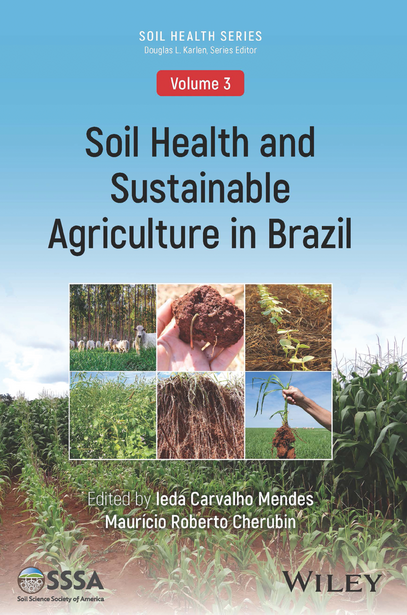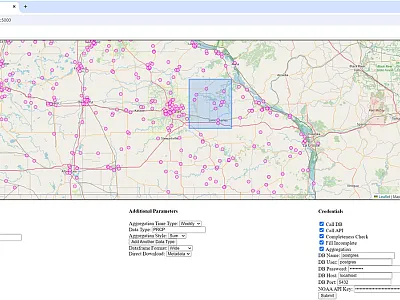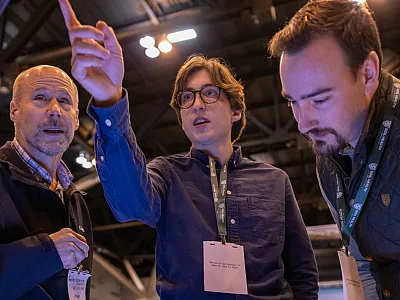New Books
Soil Health and Sustainable Agriculture in Brazil

In just 50 years, Brazil has grown to be one of the biggest food producers and exporters on the world stage—for example, boosting grain production from 38.1 million tons in 1975 to 315.8 million tons in 2023. The adoption of soil‐health‐focused management practices helped facilitate this agricultural evolution. As global demands for food increase and climate change stresses agricultural systems, Brazilian soils face new challenges.
The new book, Soil Health and Sustainable Agriculture in Brazil, just published by the Societies, explores these gains, trials, and opportunities. CSA News magazine discussed the book, the third volume in SSSA’s Soil Health Series, with its co‐editors Ieda de Carvalho Mendes and Maurício Cherubin. Mendes is a researcher at EMBRAPA Cerrados in Planaltina, Distrito Federal, Brazil, and Cherubin is a professor at the Luiz de Queiroz College of Agriculture, University of São Paulo in Piracicaba, São Paulo, Brazil.
CSA News: Where did the idea for this book come from?
Ieda de Carvalho Mendes: This book originated from an invitation by a dear friend, the researcher Douglas Karlen [a soil scientist retired from USDA‐ARS and editor of SSSA’s Soil Health Series]. Initially, the idea was for Maurício and me to write a chapter addressing the theme, “Soil Health in Brazilian Agriculture.” Following this invitation, we argued that the topic was so extensive that it could fill an entire book. Doug liked the idea very much.
Maurício Cherubin: Our work as guest editors of this book was only possible thanks to the 68 authors who contributed to the 12 chapters. These authors represented 25 institutions distributed in all regions of the country. It is a collective work that truly represents soil health concepts, advances, and applications in Brazil.
CSA News: As the world faces challenges related to climate change and food security, why is now the right time to publish (and read) this book?
Mendes: All these challenges will be very tightly linked to what happens in Brazil since the country stands out as one of the main players within the agricultural sector in the world. Brazil is working hard to be a soil health ambassador worldwide through the massive adoption of sustainable agricultural practices and systems across the country.
Cherubin: In parallel with this transition to more sustainable agriculture taking place in the Brazilian fields, much scientific progress is being made on soil health in the country. In this context, this pioneering book became a reference milestone for soil health in tropical agriculture.
CSA News: What are some of the major challenges facing agriculture in Brazil, specifically?
Cherubin: Climate change [has] been impact[ing] Brazilian agriculture since it is one of the most vulnerable sectors. Healthy soils are the foundation for building [a] more resistant and resilient production system, not only to mitigate the impacts of climate change, but also to be adapted to the current climate scenario, particularly for the climate conditions for the next decades.
Mendes: In a country so rich in natural resources, it is a huge responsibility and challenge to reconcile agriculture production with sustainability. Among the major challenges, we can mention the need to reduce the reliance of Brazilian agriculture [on] external fertilizers. Another significant challenge lies in recognizing and rewarding 21st‐century agriculture not only for its production of food, fiber, and fuel, but also for its capacity to provide services such as carbon sequestration and greenhouse gas mitigation. Brazilian scientists are working hard to establish robust metrics for the payment of environmental services.
CSA News: Who is this book for, and who can this knowledge help?
Mendes: This book is designed to offer practical knowledge to a diverse audience, including students, professionals, researchers and academia, producers and farmers, consultants … as well as the general public.
Cherubin: Again, it is a milestone for the soil health field in Brazil, being the first book entirely dedicated to this topic in the country. Also, we expect that this book will not only arouse the interest of Brazilians, but certainly can be useful for a global audience interested in soil health. Brazil is a reference in tropical conservation agriculture, so the lessons and progress presented in this book can be an interesting case for other countries.
Dig Deeper
Soil Health and Sustainable Agriculture in Brazil is available for purchase through the Wiley Online Library here: https://bit.ly/soil‐health‐sustainable‐agriculture‐brazil
Text © . The authors. CC BY-NC-ND 4.0. Except where otherwise noted, images are subject to copyright. Any reuse without express permission from the copyright owner is prohibited.







